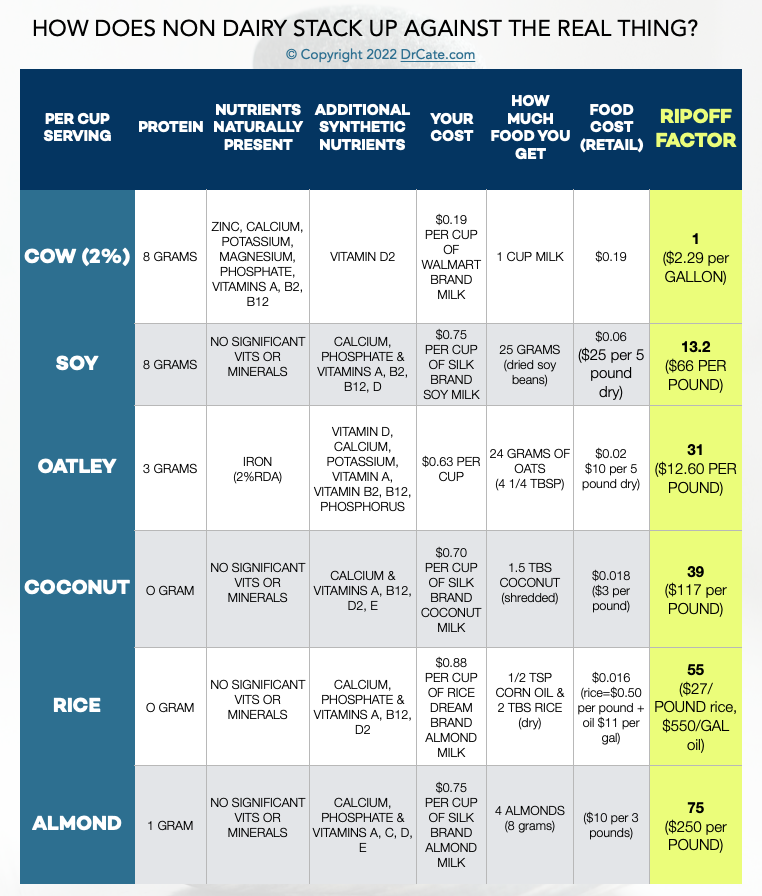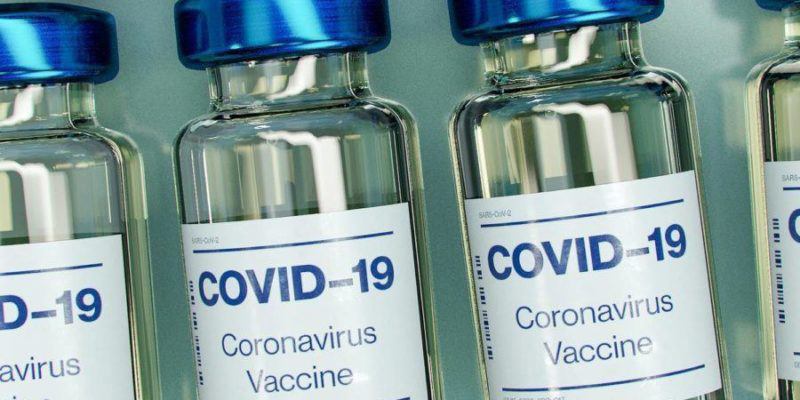Infant formula is 98% ultra-processed oil, sugar, and protein powder. Homemade infant formula can help a child thrive in many of the same ways as breast fed babies.

What is the Best Non Dairy Milk?
If you’ve noticed these alternative milk are taking over more and more of the grocery store, this article will help you decide if you should jump on this latest trend. It answers the following questions (listed in the TOC)
Table of Contents
- What’s the best alternative to cow’s milk?
- How does the nutritional value of coconut milk, oat milk, soy milk, and other non-dairy milk options stack up against cow’s milk?
- Are coconut milk, soy milk, almond milk, oat milk, and rice milk as nutritious as cow’s milk?
- What can I drink if I’m lactose intolerant?
- What should I put in my coffee instead of non-dairy coffee creamer?
- Is Cow’s Milk Inflammatory?
- If I’m intolerant do I need to avoid all dairy?
Let’s start with the most important question:
What’s the best alternative to cow’s milk?
If you’re looking for an alternative to cow’s milk, there’s really only one with any nutritional value at all. That’s soy milk. According to the label, soy milk gives you about the same total protein as cow’s milk. However, soy protein does not have the right balance of amino acids to meet our daily needs, as discussed in this article about getting enough protein.
This article is continued below...(scroll down)
How does the nutritional value of coconut milk, oat milk, soy milk, and other non-dairy milk options stack up against cow’s milk?
I started making the below chart to answer this question. But as I was going through it I quickly realized that these products are mostly water and that meant consumers were being taken for a ride. So I added a column, labeled RIPOFF FACTOR, to show you what a rip-off all these kinds of milk are!
(I think that might be the actual reason non-dairy milks are so trendy.)
What the chart below reveals listed under the column heading “how much food you get” is just how little is actually in there. The “food cost” column reveals how inflated the prices of all these plant-based kinds of milk actually are.
Most of the chart is self-explanatory but the RIPOFF FACTOR might not be.
The RIPOFF FACTOR is calculated based on the cost of the main ingredient at retail multiplied by the number of servings it would take to equal the same amount of the main ingredient. The result is the ripoff factor, meant to reflect how much more you are paying than if you just bought the ingredients yourself. A Ripoff Factor of 1 means there’s no difference, you get exactly what you pay for. A Ripoff Factor of 2 would mean you’re paying twice as much for them to put it in the box for you as if you just bought the ingredients yourself.

Let’s look at how I calculated almond milk’s ripoff factor. The entire box of almond milk is made with 16 almonds, which should cost you about $0.014 (1.4 cents) but they’ll charge you $3.50 for the box, which is 75 x as much as the cost to buy 16 almonds—and that’s paying retail (for a 3-pound sack of almonds). The ripoff factor of 75 means you’re paying 75 times as much per pound to buy it in the milk form as you would if you bought a 3-pound bag of raw almonds.
Manufacturers pay less than retail. So my method of calculating the ripoff factor is probably underestimating the true magnitude of consumer exploitation.
In my view, your box of almond milk is a box of massive profit margin for Big Food.
Are coconut milk, soy milk, almond milk, oat milk, and rice milk as nutritious as cow’s milk?
Not even close.
These products are mostly water. Rice, oats, and coconut are not highly nutritious foods to begin with, and since the amount per serving is so small, the resulting rice milk, oat milk, coconut milk, almond milk, and soy milk are not good sources of any natural vitamins or minerals. The best of the bunch, in terms of natural nutrients, is oat milk, which does contain measurable amounts of iron but even that is a scant 2% of the recommended daily amount.
Almonds are very nutritious, but the almond milk products available are so watered down it there are still no measurable natural nutrients.
The vitamin and mineral content claims on the label might make you think these alternative kinds of milk are more nutritious than cow’s milk. But these are not honest numbers. Manufacturers add synthetic vitamins and minerals to make their products appear nutritious. How would you know? Just look at the ingredients list.
If you want synthetic vitamins you’d be better off just buying a vitamin pill. I say this because vitamins and minerals can become less bioavailable when stored in the liquid state compared to storage in dry powders.
The chart above breaks down today’s most popular dairy alternatives in terms of how they compare to cow’s milk, including soy milk, almond milk, Oatley (oat milk), rice milk, and coconut milk.
What can I drink if I’m lactose intolerant?
If you are lactose intolerant and looking for the most nutritious milk, your best bet is lactose-free cow’s milk, available in most grocery stores.
Lactose-free cow’s milk has come a long way since the early days when processing could not eliminate lactose as fully as it can today. If you’ve not tried lactose-free milk in a few decades, it might be worth another shot.
If lactose-free milk causes problems, you may have another issue with dairy. I discuss this below in the section that answers the question: “If I’m intolerant to one kind of dairy, do I need to avoid all dairy?”
What should I put in my coffee instead of non-dairy coffee creamer?
This is a great question because non-dairy coffee creamer is a highly processed product often containing toxic fats since most companies use seed oils as the fat source. I would strongly recommend avoiding non-dairy creamer that contains any of the Hateful 8 seed oils.
I also recommend avoiding creamer that contains casein, whey protein, or any ingredient that shows up as “protein” on the list. These are all ultra-processed ingredients. I recommend avoiding ultra-processed ingredients whenever possible.
That said, I was asked to weigh in on 8 of the most popular coffee creamers available on the market for Mel Magazine. Here’s how they stacked up:
Omega PowerCreamer (Best of the bunch)
Dunkin’ Donuts Extra Extra Creamer
Nutpods Creamer
Califia Farms Better Half
Silk Soy Creamer
So Delicious Oatmilk Creamer
Coffee-Mate Creamer
International Delight Creamer (Worst of the bunch)
Healthy fats brought the winners to the fore, as did considerations over the lack of artificial ingredients and stabilizers. The lowest sugar content helped sort the losers. Coffee-Mate has one of the Hateful 8 but it beat out International Delight due to excessive sweetener and high (empty) calorie count. International delight has some palm oil which is an ok oil, but it does not have that much.
Is Cow’s Milk Inflammatory?
Milk can cause bloating, cramping, diarrhea, heartburn, hives, acne, and eczema. Given all these different potential problems, it’s understandable that folks label milk as inflammatory. But milk is not the real problem.
The real problem is our modern diet and lifestyle, which attacks our digestive system in multiple ways.
Seed oils inflame our intestinal lining so that we can lose digestive enzyme functions, especially after infections. Antibiotics drastically alter our microbiome. Today’s gut problems include new DNA mutations that cause disrupted gut function that even the best diet may not fully revere.
Today, most children are weaned on ultra-processed foods and toxic seed oils. So their little bodies are increasingly deprived of real nutrition and subjected to chronic inflammation. In my mind, this is the obvious explanation for the dramatic rise in serious food allergies among the US population.
It’s not just milk, but eggs, wheat, tree nuts, shellfish, and other common foods are now increasingly problematic for our youth. It’s a terrible catch-22 when it happens because the very foods that would convey much-needed real nutrition are now off-limits.
There is hope. You can resolve food allergies if you become a strict seed oil disrespecter and strictly avoid these toxins. It takes a few years, but it will help.
If I’m intolerant do I need to avoid all dairy?
Milk is a complex food, with dozens of different types of proteins. Each different type of protein can trigger allergic reactions. There are also hormones to consider, which can trigger acne or mucus reactions. The solutions could be using only organic, choosing certain types of cheese, certain types of yogurt.
The good news is these issues can resolve with overall diet improvements.
And there’s more good news because sometimes you can switch to products from a different animal. Instead of cow, you can try goat milk, for example. Some people can’t do certain kinds of cheeses because the concentration of casein or lactose is too high. But cheeses with lower concentrations of these components can be just fine.
Too busy to troubleshoot your dairy intolerance issue? If you just want to know what the best alternative is, my recommendation would still be soy because it at least offers some decent protein.
Need help sorting out what component may be causing the problem? Please schedule a consultation.
If you want to know what to put in your coffee or have product questions, please leave your question in the comments below!
Got a question or comment? Please do your best to post comments and questions on related posts. Many questions are answered already for you. You can use the search bar to find topics related to your question.
Please note: Please do not share personal medical information in a comment on our posts. It will be deleted due to HIPAA regulations.
This Post Has 15 Comments
Note: Please do not share personal information with a medical question in our comment section. Comments containing this content will be deleted due to HIPAA regulations.



















To be fair, cow’s milk is also mostly water, though it seems to be well mixed. Milk powder would be impossible if this were not so.
I follow Weston A Price guidelines, to some degree and that organisation is dead against soy (except naturally fermented products), so I was quite suprised that you list soy as one of the better non-dairy milks. I try to steer clear of soy if I can, apart from naturally fermented soy sauce (which is delicious).
I’m suprised coconut milk has no nutrients in it. I make my own coconut yoghurt (easily) from canned coconut milk or cream, which has 50% or more coconut solids in it, so are you saying coconut meat has no nutrients?
I agree, though, that cow’s (or goat’s) milk is the best milk, preferably raw. Having said that, I barely eat cow’s milk, at the moment, except in kefir, butter and cheese. I have my coffee and tea black.
I occasionally consume milk and cheese products. I drink coffee black. I am suspicious about non dairy milk. Type A2 cow’s milk seems promising. Although most of the research has been funded by the A2 milk industry, early test results and most agree that many of the problems with cows milk are not associated with A2 milk from Jersey, Guernsey, and some other breeds.
Dr Cate,
My stepson is severely allergic (anaphylactic) to all dairy, eggs, fish, nuts and sesame. It is incredibly difficult to eat out or buy any processed food for the ‘May contain’ or ‘made in a factory’ caveats. He is 13 years old and I would like to know what I should focus on including in his diet to compensate for the foods that he is allergic to.
Many thanks,
Sarah
HI Sazmo,
That sounds incredibly stressful. Good for you for keeping processed foods away from him! I can’t give personalized medical advice in comments of course but someone in is position could consider a carnivore or GAPS diet. And I’m available for nutrition consultation. Just click the make an appointment button. At the top of the page. Best wishes to you both!
Hi Dr. Cate,
Can you help with other nut milk options? I make all my own milked nuts from soaking and blending. Looking at fat content vs other nutrients I would love some help with the differences of the following: cashew, macadamia, and walnut. Any help would be great! Thanks for great content.
Making your own is the best way to go! The nutrition is going to be the same as the nuts themselves, and unless you’re heating the milks there won’t be any concerns over oxidized PUFA.
Hi Dr Cate!
I’m in the middle of your book and I’ve seen that you speak very critically of soymilk (the soy beans are damaged during the processing making the product toxic?) but then you included soymilk in a recipe and wrote about its nutritional value at the end of the book… can you please clarify? What’s the scoop on soymilk (pure organic soy beans and water)? Is it toxic or just not comparable to real milk?
Thanks!!
Goodness, that is confusing.
Here’s what I should have said: If you make soy milk yourself, it’s just fine! Same nutrition as the beans as long as you don’t toss any parts during the process you follow.
But I would avoid store-bought. In addition to toxins, most soy milk includes multiple synthetic vitamins and added minerals in the ingredients because the processing destroys natural nutrients.
Unless you can find a brand that specifically states they use minimal heat. In that case not only would there be fewer toxins, they would not need to add any minerals or vitamins because they would naturally be retained. And you would know by the ingredients.
Can you kindly tell me which book has that issue?
Thanks so much for the clarification!
It’s Deep Nutrition. Although right now I can’t seem to find the part where I read it…
Dr Cate,
Is Soy milk safe for men. I remember reading something about men avoiding it?
Please advise.
Thank you!
Soy is safe for men. The concern comes from traces of estrogen-like compounds in soy called isoflavones and sometimes called phytoestrogens. But the physiology of our bodies effectively protects us from being influenced by outside hormones. That said, these compounds are concentrated in soy protein, so if you are living off of textured vegetable protein or soy protein isolates and hydrolysates, you are likely to be getting a lot more of these plant hormones than nature ever intended your body to handle.
What is your opinion for ultra-filtration milk. For example, the Fairlife brand. I drink their whole milk.
Thank you.
Ultra fitration removes sugars, water and minerals. They are vague about which minerals are lost and what percentage. It is still better than the non dairy milks and definitely better than whey protein powder.
I am a fat-adapted marathoner (largely due to Fat Burn Fix and Deep Nutrition!) and I thank Dr. Cate. I love milk except for the carbs, so I drink almond milk (Mooala, Three Trees, or Malk brands). These satisfy my pallet for something similar to whole cow’s milk.
I am more concerned about almond milks (or coconut, macadamia nut milks) with additives and preservatives. I hoped this article would give more attention to the ingredients.
I wouldn’t drink grain-fed pasturized milk unless I was starving. Even without lactose intolerance, it’s the fast track to GI upset. It’s unclear if you absorb milk’s calcium. Milk drinking nations have the worst osteoporosis. Plus I want no part in GMO corn and CAFO cattle. Ditto GMO soy. I don’t drink alternative milks for protein, because I read the labels. I dislike fortification with cheap minerals or vitamins that you may not absorb. When I’m not busy, I make my own hemp or macadamia milk and don’t strain it to keep the fiber. Otherwise I choose flax, hemp or macadamia milks. I only use a little on granola and in occasional pancakes. Per your article, I will try water in pancakes (cheaper). I throw a few walnuts in my smoothies for good fats.